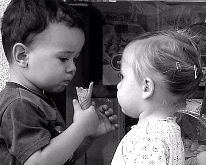Spontaneity Rules
By Peter LloydCreativity is sometimes associated with letting go, acting silly, hugging strangers, exchanging gratuitous and often insincere praise and encouragement, and all sorts of feel-good, new-agey nonsense. Of course, anyone who has ever created anything useful to anybody has some idea of the discipline, determination, and sacrifice required to invent or innovate.
No matter whether we have any or not, we believe, or at least we've been told, that self-control is good stuff. We know, for example, that when a champion takes a title or a trophy, it's not the result of a half-hearted effort or just visualizing victory real hard. Detested are the parents who allow their children to run wild through your garden.
At the risk of scandalizing my rabbi, personal confessor, guru, or creative advisor, I'd like to pass along something I came across recently that poo-poos the value of self-control—a news item on Psychological Science—Try A Little Powerlessness.
The gist of the experiment described in the article goes like this: Researchers wore out white subjects with mental exercises to the point where they had relinquished all their reserves of discipline. (Must have something like trying to get a simple answer from an insurance company over a voice-activated phone system.) The discipline-depleted subjects were asked to talk with a black interviewer about racial diversity.
 The black-on-white interviews were analyzed and the consensus emerged that the wagged-out appeared to converse much more comfortably than the control subjects.
The black-on-white interviews were analyzed and the consensus emerged that the wagged-out appeared to converse much more comfortably than the control subjects. In short, there's a downside to self-control. When we behave in a well-intentioned, too careful manner, it seems, we not only don't feel that good, we don't come off as well either. There's liberation in letting go of our inhibitions.
We know that letting go works in brainstorming sessions as well as in our solo creative efforts. While our hair is down our creative powers rise. Now it's good to see that maybe letting it all hang out might be better for our social lives as well.
Peter Lloyd is co-creator with Stephen Grossman of Animal Crackers, the breakthrough problem-solving tool designed to crack your toughest problems.
